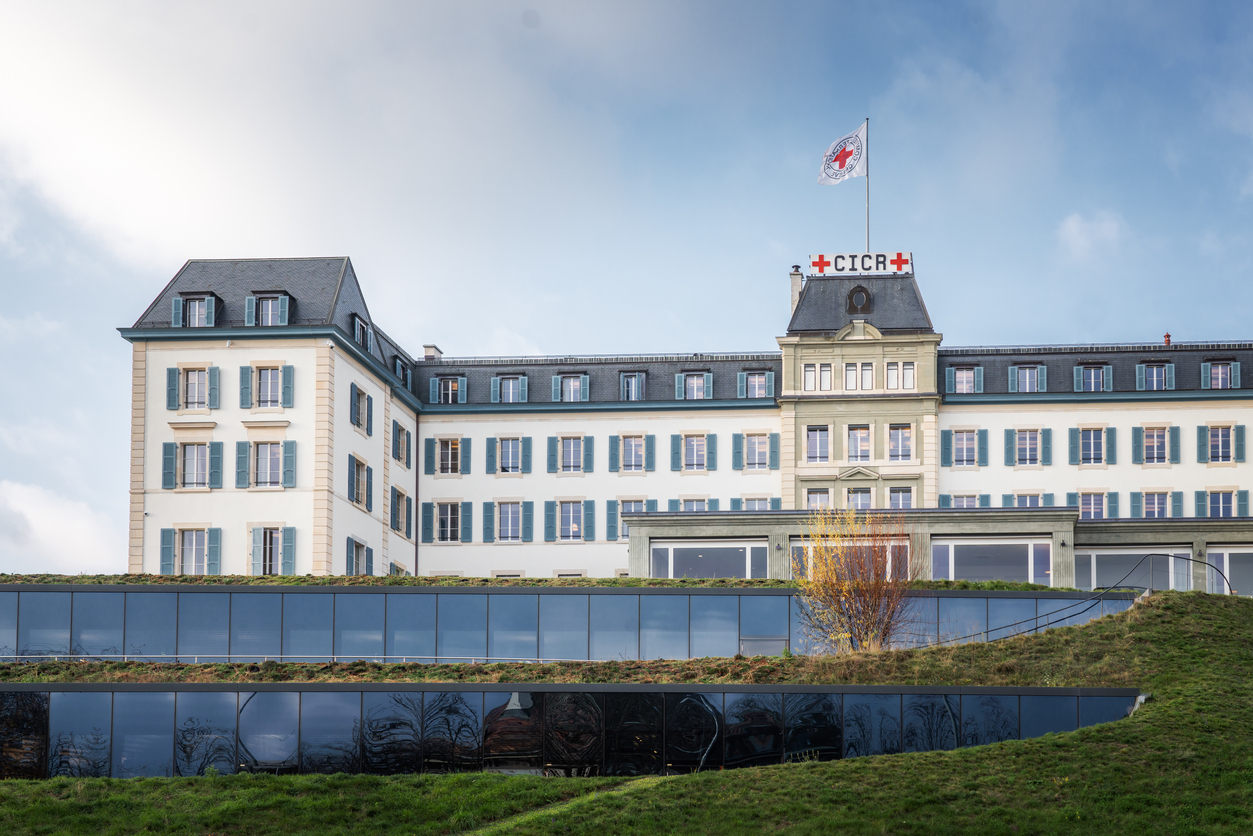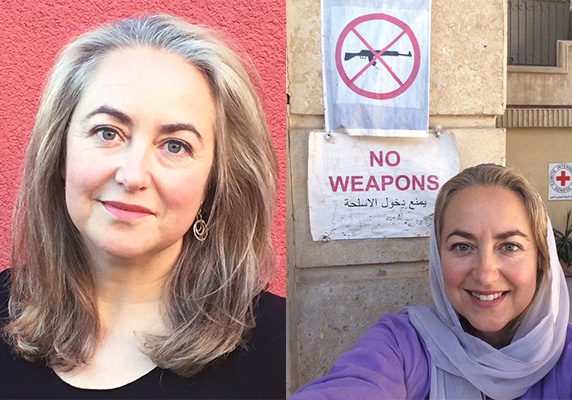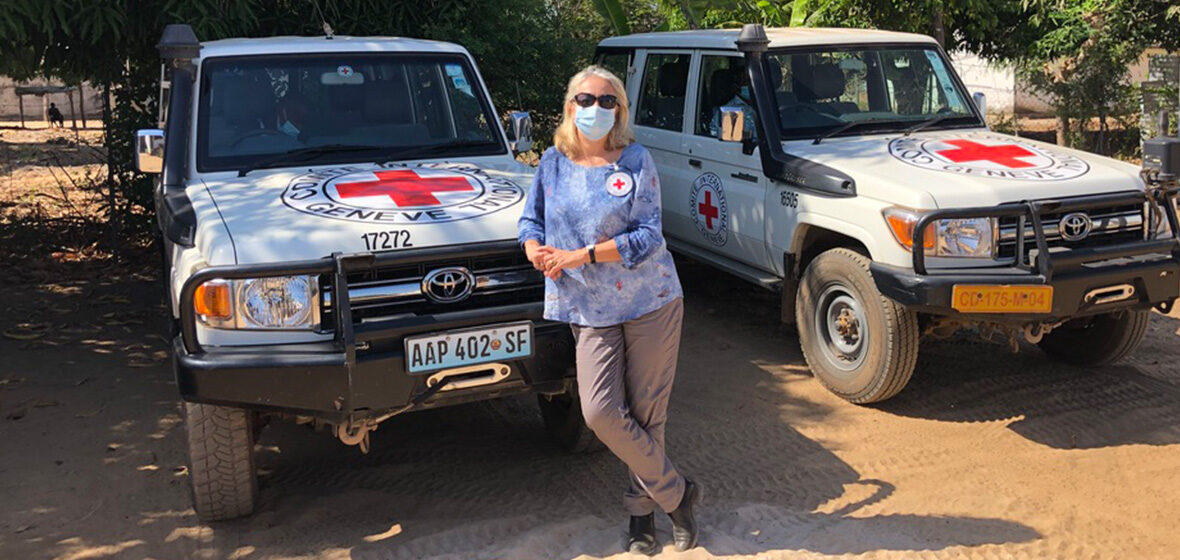Dr Helen Durham reflects on her career in international humanitarian law with the Red Cross in Australia and the International Committee of the Red Cross and offers practical advice for lawyers aspiring to follow a similar path.
“I’m often asked by lawyers about how they can establish a career in international humanitarian law,” says Dr Helen Durham, an internationally renowned expert in the field.
Now her years with the Red Cross and the International Committee of the Red Cross (ICRC) have ended, Durham has time to reflect. She shares the story of her career with LSJ, and offers practical advice for those aspiring to follow a similar path.
Academia – a PhD in International Humanitarian Law and International Criminal Law, and the role of Senior Fellow at Melbourne Law School – provided a solid foundation; but going into the field was what “keeps the fire in your belly”, Durham says.
In 1996, Durham began working with the Red Cross in Australia as National Manager of the Laws of War. She worked with various committees across the country, did military exercises with the Australian Defence Force, and taught journalists about the laws of war.
Between 2002 and 2006, she was the legal adviser to the ICRC Pacific region delegation, based in Suva. “I was in and out of Fiji, Vanuatu, and Solomon Islands to help their governments understand the laws of war.”
From 2006 to 2008 Durham worked as the Director of Research & Acting Associate Director at the Asia Pacific Centre for Military Law, before joining the Australian Red Cross again as its Head of International Law and Principles. In 2012, she became the Director of International Law and Strategy.
In 2014, Durham left Australia to work in Geneva as Director of International Law and Policy in the ICRC.

The ICRC, which includes the Red Crescent Movement, operates in 192 countries and has approximately 20,000 staff. She headed a legal department of 150 lawyers, 100 former military officers and international policy makers and diplomats.
Durham lived at the ICRC headquarters in Geneva but “spent about fifty per cent of my time in the field, from Iraq to Gaza, Somalia, New York, Brussels … I did a lot of travelling because my department of 400 experts were across the world in different locations. [The work] took me into the conflict zones of Aceh, Myanmar, Iraq and Mozambique, and negotiating tables in Brussels, New York and Geneva.”
Her role ended after eight years, in 2022: “The way the ICRC works,” she explains, “is that you can only have that amount of time as a director. After my mandate was up, I also realised that after 26 years working within the Red Cross and Red Crescent movement, I needed to have a break and to reflect on how to use my skill set in other areas.”
Now Durham is a Board Member of Geneva Call, a non-profit organisation working to protect civilians in regions where armed conflict threatens their welfare.
“A couple of firsts”
Durham was the first person to break the long-held norm — 150 years — of a Swiss male in the role of Director of International Law and Policy.
“With my appointment, there were a couple of firsts,” she says, “including being a woman in a traditionally male space that deals with weapons, the conducting of hostilities, and treaty negotiations. I was the first Australian ever to be in the directorate of the ICRC. There’s no stereotypical national characteristics, but Australians tend to be a bit more informal than Europeans.”
Durham adds, “Navigating the gender and the culture issues was both a challenge and a privilege. In retrospect, I don’t know if I would have gone to do the job if I’d understood how complicated it would be. I did my best to have authentic leadership and to show different pathways and different decision-making processes. I’m delighted I did it, but as the first [woman and Australian in the role], it is a privilege but also places transactional costs on oneself.”
Durham explains, “International humanitarian law, and law of war in particular, is an area that looks at reducing suffering during times of armed conflict. You find it in the Geneva Conventions and the range of weapons treaties that limit the use of particular weapons like landmines, blinding laser weapons, or nuclear weapons. All that is part of the legal framework.”
A large aspect of her role was communication between her many international colleagues and diplomats globally.
“There’s a lot of representation work and a lot of chairing, so we would have meetings with States about seeing if we could create some sort of policies around the laws of war or the environment, and my particular focus was always on the laws of war and gender issues, and how we could reflect the reality of women in conflicts. Sometimes at those meetings there would be 200 diplomats in the room.”
Going into the field proved essential, enabling Durham to connect with the practical and immediate needs of individuals and communities she was working for.
“If you’re trying to persuade government authorities and military to change their tactics, you have to see the people in your mind to keep that fire in your belly, so that you never let it become academic or routine. So, going into places of detention in Iraq, enabling communication between family and detainees through messages, or talking to Hamas in Gaza about allowing families to visit detained family members. Dealing with non-state armed groups and authorities in those places then allowed us to take those issues to New York or Brussels.”

Good days and bad days
One of the highlights of Durham’s career has been establishing the treaty to ban nuclear weapons, and she spent a lot of time in Hiroshima meeting the intergenerational families affected by the 1945 atomic bombings.
A “good day” would be when she was able to facilitate messages between families and detainees, with the aid of local staff, which sometimes resulted in giving hope and relief to families who mistakenly thought their son or father was dead.
“The human agency of bringing families back together, it’s a good day when you do that. It’s a good day when you are part of negotiating humanitarian corridors, so that people can survive and get out.
“A bad day is when a colleague is kidnapped or executed. And security issues are very heavy in the ICRC. A bad day can really erode your soul, so you have to find a balance.”
Durham says, “I’ve always loved the idea of law as a tool for social change. [But] it doesn’t always make the changes we want, and it takes time. People can be very cynical about trying to ban landmines, for example, but law can create a stigma around the use of those weapons. The rule of law is supposed to be punitive, but within society, it can carve out what we believe is right and wrong, and over time, it stigmatises these things so that it becomes ‘of course we don’t use these things’. It’s about understanding a long lens on international law, rather than an immediate impact.”
“When I was younger,” she reflects, “I was naïve in thinking you create a law and it’s all done, but now I understand that it’s the first step in the question of ‘how are you trying to change human behaviour?’”
When I was younger, I was naïve in thinking you create a law and it’s all done, but now I understand that it’s the first step in the question of ‘how are you trying to change human behaviour?’
Want a career in international humanitarian law?
Durham comments, “My own route was not strategised, and my key advice is to gain experience through travel, voluntary work and post-graduate studies before seeking leadership roles in the field.” These are her recommendations:
- A young lawyer has a long life ahead of them; you don’t have to do everything [at the start]. I practised as a lawyer with the unions in Melbourne for a couple of years, which taught me skills I still apply now.
- Identify the key issues. During my Honours in Law, I focused on Vietnamese women and domestic violence in Melbourne. This was the result of approaching Legal Aid and asking about what issues were taking priority, which at that time was domestic violence in a particular population of recent migrants to Australia. As a practising lawyer, I went on to work with refugee women.
- Work out when your life is ready for it: travel, do voluntary work, understand the world to understand where you can add value. I worked in Thailand as a lawyer, helping sex workers in Bangkok. I travelled around India. Take some risks, don’t map everything out.
- Do further studies, do a Master’s degree, because whether it’s human rights or environmental rights, organisations look for those with expertise.
- Explore international study opportunities based on what excites you. Going overseas and doing my PhD studies at NYU really made me think differently. I worked hard to get a scholarship.
- Get some international experience during a Masters or a PhD, then do some voluntary work in Australia, go to meetings with environmental groups, and understand the community you want to be part of. Network.




